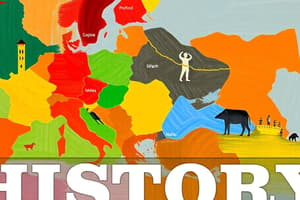Podcast
Questions and Answers
What is a characteristic of the Medieval period?
What is a characteristic of the Medieval period?
- Dominance of democratic political systems.
- Transition from antiquity to the Renaissance. (correct)
- Emerge of organized societies with complex technologies.
- Characterized by industrialization and urbanization.
Which historical period is known for the absence of written records?
Which historical period is known for the absence of written records?
- Contemporary period
- Prehistory (correct)
- Early Modern period
- Medieval period
Which statement best describes primary sources?
Which statement best describes primary sources?
- They only consist of online materials.
- They include artifacts from the period being studied. (correct)
- They are often biased narratives about the past.
- They are interpretations of historical events.
What is considered a defining factor for categorizing historical periods?
What is considered a defining factor for categorizing historical periods?
Which of the following is a purpose of studying history?
Which of the following is a purpose of studying history?
What is a trait of the Modern period?
What is a trait of the Modern period?
What does historical criticism entail?
What does historical criticism entail?
Which period is characterized by ongoing technological advancements and current events?
Which period is characterized by ongoing technological advancements and current events?
Flashcards
Historical Periods
Historical Periods
Divisions of history based on defining factors like political systems or technology; transitions are gradual, not exact.
Prehistory
Prehistory
Time before written records.
Primary Source
Primary Source
Original document or artifact from a time period (letters, diaries, records).
Secondary Source
Secondary Source
Signup and view all the flashcards
Historical Context
Historical Context
Signup and view all the flashcards
Historical Methodology
Historical Methodology
Signup and view all the flashcards
Historical Interpretation
Historical Interpretation
Signup and view all the flashcards
Historical Significance
Historical Significance
Signup and view all the flashcards
Study Notes
Historical Periods
- History encompasses the entirety of past events and experiences that shape the present.
- Different periods are categorized by specific defining factors, such as political systems, social norms, or technological advancements.
- These periods often overlap and don't have absolute start and end dates; transitions are gradual.
- Periods are often subjective and historians may diverge on specific dates and classifications.
Key Historical Eras
- Prehistory—the period before written records.
- Early civilizations—emergence of organized societies, often characterized by agriculture, urban centers, and complex social structures.
- Ancient history—includes major empires and civilizations like the Egyptians, Greeks, Romans, and others.
- Medieval period—transitional period from antiquity to the Renaissance, characterized by feudal systems, religious influence, and societal shifts.
- Early Modern period—witnesses significant advancements in science, exploration, and political organization.
- Modern period—industrialization, urbanization, and global conflicts dominate the landscape.
- Contemporary period—current events, technological advancements continue to shape the world.
Historical Methodology
- Primary sources—original documents or artifacts from the time period being studied, e.g., letters, diaries, official records.
- Secondary sources—interpretations and analyses of primary sources by historians, including books, articles, and scholarly journals.
- Historical criticism—process of evaluating historical sources for accuracy and bias.
- Historical context—understanding the specific circumstances and conditions of a historical event.
- Historical interpretation—the process of building a narrative from sources, acknowledging potential biases and limitations.
Historical Significance
- Understanding the past illuminates the present.
- History shapes cultural values and identities.
- Historical analysis facilitates critical thinking skills.
- Studying history fosters empathy and understanding diverse perspectives.
- History allows us to learn from past successes and failures.
Studying That Suits You
Use AI to generate personalized quizzes and flashcards to suit your learning preferences.




